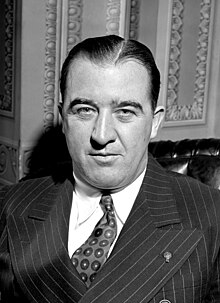Happy Chandler
Albert Benjamin "Happy" Chandler (born July 14, 1898 in Corydon , Henderson County , Kentucky , † June 14, 1991 in Versailles , Kentucky) was an American politician , governor and US Senator for the state of Kentucky and sports official.
Early years and advancement
In 1917, Albert Chandler, who liked to be called "Happy Chandler," graduated from high school. This was followed by courses of study at Harvard University , Transylvania University and finally the University of Kentucky , where he received his law degree in 1924. A year later he was admitted to the bar and established a law firm in Versailles, Kentucky. In 1930 he was elected to the Kentucky Senate; as early as 1931, the next step on his career ladder followed with his election as lieutenant governor . The next four years were marked by a conflict with Governor Ruby Laffoon . Chandler opposed the policies of his fellow party member Laffoon, who then curtailed the powers of the lieutenant governor. Laffoon also campaigned for Thomas Rhea and against Chandler in the nomination for the 1935 gubernatorial election . Eventually, Chandler prevailed against Rhea in the primaries and was nominated as a Democratic candidate. He won the subsequent actual election with 54.5% of the vote against the Republican King Swope , who got a share of 45.1%.
First term as governor
Chandler's first term from December 10, 1935 to October 9, 1939 was one of the most successful terms of any Kentucky governor ever. During this time he reduced the national debt by 75 percent. He cut the bureaucracy and reformed the government apparatus. He also promoted road construction and the expansion and construction of schools and prisons. Education policy was generally supported, for example with free learning resources and a pension program for teachers. At the same time, an aid program for the elderly was created. Another major project of the time was the electrification of rural Kentucky, which Chandler advocated. His personal commitment in 1937 on the occasion of a flood on the Ohio is also noteworthy . However, he also had to raise taxes to finance his policy. He was helped by the fact that the sale of alcohol in Kentucky was allowed again and a tax could now be levied on it.
Despite all of this, Harlan County 's labor unrest broke out and the governor had to grapple with it. By the end of his term in office, the country had largely recovered from the global economic crisis . In Kentucky, in addition to the successful New Deal policy of the federal government under President Franklin D. Roosevelt , this was also thanks to the policy of Governor Chandler. On October 9, 1939, he resigned from office to serve as a US Senator in Washington, DC .
US senator and baseball official
From October 1939 to November 1945 he represented his state as a senator in Congress . There he usually supported President Roosevelt's policies. As a member of the military committee in World War II, he opposed the political stance of giving the European theater of war priority over the Asian. In November 1945 he resigned from the Senate to take on a senior position in Major League Baseball . He was elected Commissioner , which roughly corresponds to the President of the League Association. After clashing in this position with some club leaders because of internal problems, he did not succeed in being confirmed in 1950. He then returned to work as a lawyer. In 1955, exactly 20 years after his first election as governor of Kentucky, he decided to run again. In the primary, he succeeded in asserting himself against his internal party rival Bert T. Combs . As a Democratic candidate, he finally won the election against Edwin R. Denney with 58.0% of the vote, Denney came with 41.5%.
Second term as governor
His second term as governor began on December 13, 1955 and ended four years later on December 8, 1959. During this time, he promoted the expansion of the country's universities and schools. The University of Kentucky Medical School alone received a $ 5 million federal grant. He enforced racial equality in schools, although his personal approach to the issue is contradictory. Among other things, before he took office for the second time, in 1948 he supported the anti- desegregation presidential candidate Strom Thurmond . On the other hand, he pushed through the racial integration at two schools with the help of the National Guard against local resistance. Chandler also campaigned for a pension system for all state employees in his second term.
Another résumé
Chandler remained politically active even after the end of his second term. In 1963, 1967 and 1971 he applied unsuccessfully for his party's re-nomination as candidate for governor. He was also a curator at Transylvania University and the University of Kentucky. Happy Chandler died on June 14, 1991 at the age of almost 93. He was married to Mildred Watkins and they had four children together. The grandson Ben also became a politician and was Kentucky's representative in the United States House from 2004 to 2013 .
Web links
- Chandler in the National Governors Association (English)
- Happy Chandler in the Biographical Directory of the United States Congress (English)
- Happy Chandler in the database of Find a Grave (English)
| personal data | |
|---|---|
| SURNAME | Chandler, Happy |
| ALTERNATIVE NAMES | Chandler, Albert Benjamin (real name) |
| BRIEF DESCRIPTION | American politician |
| DATE OF BIRTH | July 14, 1898 |
| PLACE OF BIRTH | Corydon , Kentucky |
| DATE OF DEATH | June 14, 1991 |
| Place of death | Versailles , Kentucky |




